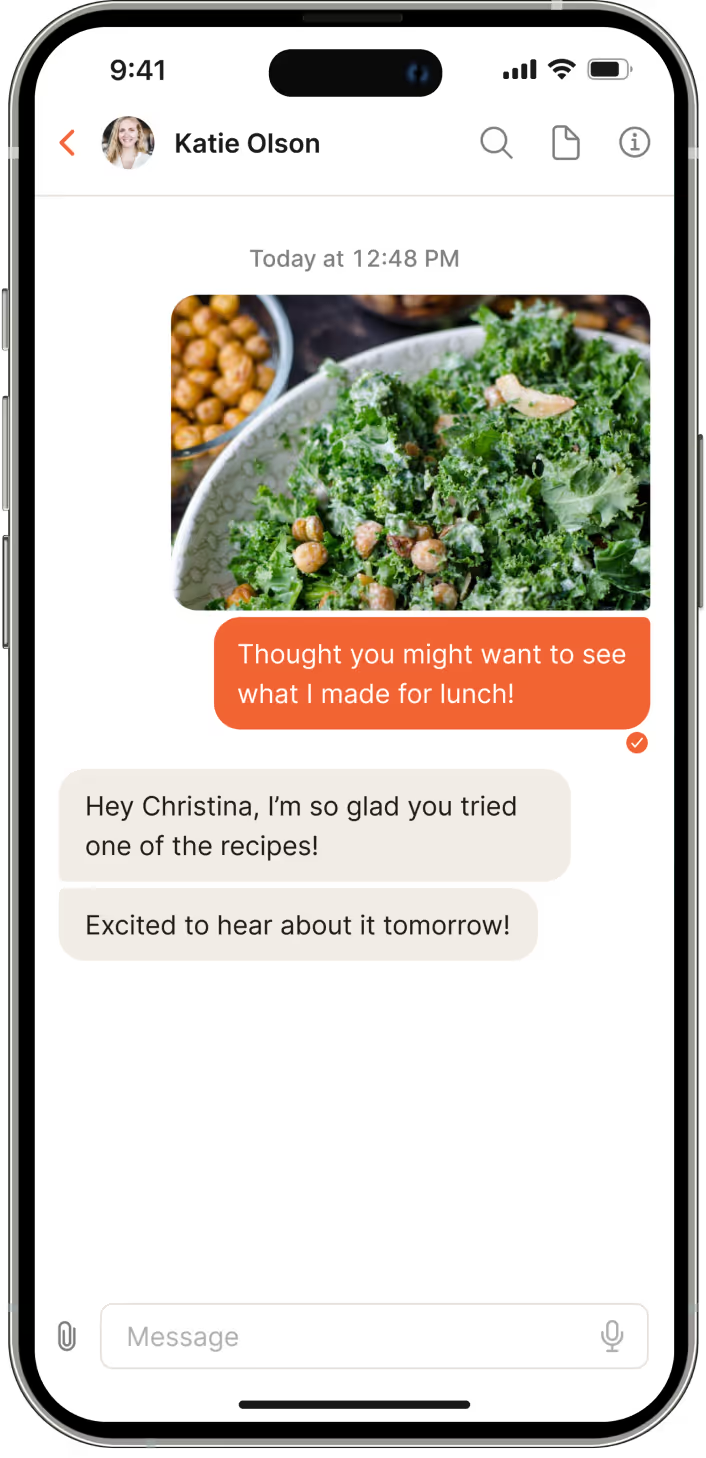Find the Best Diabetes Dietitian Near Me
94% of Nourish patients pay $0 out of pocket!


Our team of dietitians can support all areas of your health
Our team of nutritionists are skilled in numerous specialties. Whether your needs revolve around sports, weight loss, a chronic illness, or navigating a pregnancy, our professionals are prepared to provide the right nutritional guidance.









Personalized diabetes nutrition planning
Personalized nutrition planning
We offer virtual one-on-one sessions with registered dietitians specializing in diabetes management. During your appointments, you’ll learn evidence-based practices to improve your A1c, blood sugar levels, and other areas of your health. You may not know what to expect if you’ve never met with a dietitian before. Our nutrition specialists work with you to build realistic meal plans that bolster your overall diabetes management strategy. Current diabetes nutrition guidelines recommend choosing whole foods as often as possible and enjoying meals rich in colors, fiber, and flavor. With personalized nutrition counseling, you can finally take your health into your own hands.
We offer virtual one-on-one sessions with dietitians to discuss preventative actions that can be taken to address your health concerns. We educate, assess lifestyle changes, help plan your nutrition, and support our clients toward long-lasting success using personalized nutrition counseling.
Convenient virtual appointments
Convenient, virtual appointments
Access high-quality diabetes nutrition care wherever you’re most comfortable. Thanks to convenient virtual appointments—you can speak with your dietitian anytime, anywhere. Say goodbye to driving to appointments and inconvenient waiting rooms, and manage your diabetes care on your schedule.
Receive the highest quality care wherever you are most comfortable. You get access to your dietitian virtually anytime, anywhere. No more driving to appointments. No more waiting around.
Avoid future complications with diabetes
Avoiding future complications
In addition to improving your A1C and blood sugar levels, working with a dietitian can help prevent future complications commonly linked with unmanaged diabetes. These include cardiovascular problems, nerve damage, kidney failure, and other serious conditions. Leverage your dietitian’s nutrition expertise to lower your risk of developing complications. Our experts are dedicated to supporting your health and quality of life for the long run.
The payoff you’ll see for adjusting your lifestyle with nutrition counseling will be tremendous for your health. You’re less likely to suffer from a heart condition, kidney failure, and other serious conditions with the proper discipline and determination that we help provide.
We’ve got answers.
Still deciding if we’re right for you? These frequently asked questions may help.

Can I reverse diabetes?
Diabetes reversal or remission is possible through medical treatment and lifestyle interventions. Partial remission is when A1c levels are below 6.5% for one year without medications, while complete remission requires an A1c of less than 5.7%.
What are the best foods to eat with diabetes?
Focus on minimally processed, high-fiber foods from each food group to manage diabetes:
Can a nutritionist help me manage diabetes medications?
While a registered dietitian cannot prescribe or change the dosage of your diabetes medications, they can help you find the best eating pattern to maximize the benefits of your medications, manage side effects, and avoid large fluctuations in blood sugar levels.
How does nutrition impact diabetes?
When you eat and what you eat can significantly impact your blood sugar. Going too long without eating can result in low blood sugar levels.
Foods that are high in carbohydrates and low in fiber can spike your blood sugar. Eating lean proteins, whole-grain carbohydrates, and healthy fats at regular times can help stabilize your blood glucose levels.
What is diabetes?
Diabetes is a chronic condition characterized by high blood sugar levels. When you eat, the carbohydrates from your food break down into glucose, which enters the bloodstream. Insulin is a hormone that helps your body use that glucose for energy.
When a person has diabetes, their insulin does not work properly, causing too much glucose to stay in the blood. Over time, untreated high blood sugar levels can cause damage to the kidneys, heart, nerves, and eyes.
There are three main types of diabetes:
How can I find a <Name> dietitian who accepts my insurance?
Nourish has <Name> dietitians in-network with major insurers like Blue Cross Blue Shield, United Healthcare, Aetna and Cigna. 95% of Nourish patients pay $0 when using insurance.
Are video visits with a dietitian online for <Name> covered by insurance?
Check your coverage to see if Nourish accepts your insurance plan.
What to expect during a visit with a dietitian that specializes in <Name>?
During your first appointment with a dietitian, you can expect to review your medical history, eating habits, and lifestyle. You’ll get to know your dietitian and you’ll have the opportunity to ask them any questions you have.
How can I find an online video visit with a dietitian that can help with <Name>?
Nourish offers completely virtual appointments that can help address <Name>.
How can I book a nutrition appointment online for <Name>?
Nourish offers completely virtual nutrition appointments and is covered by insurance. You can find a dietitian that’s right for you and filter by condition.
How can I see a dietitian that can help with <Name>?
Nourish has dietitians that specialize in <Name> that can help. Nourish uses evidence-based, personalized nutrition therapy so you feel your best.
A registered dietitian can also help with the following related <Name> conditions:
Can Nutrition Counseling Help with Type 2 Diabetes?
If you’ve never participated in nutrition counseling before, you may be unsure how to get started and what to expect at your first appointment.
There is strong evidence that nutrition counseling is an effective treatment tool for type 2 diabetes in combination with medical care. The goal of nutrition therapy is to support healthy eating habits that minimize the complications of diabetes. This is achieved by targeting individual blood sugar, blood pressure, and cholesterol goals through personalized nutrition interventions.
Some factors increase the effectiveness of nutrition counseling in type 2 diabetes, such as:
- At least three visits within the first six months of establishing care with a dietitian.
- Routine follow-up visits throughout the rest of the first year, followed by at least one annual follow-up.
- Evidence-based nutrition interventions.
- Goals are tailored to the individual’s preferences and medical history.
Benefits of Nutrition Counseling for Type 2 Diabetes
Research shows that people with type 2 diabetes who participated in nutrition therapy with a registered dietitian experienced up to a two percent decrease in A1c levels after three months. Hemoglobin A1c is a three-month average of blood sugar levels. Though A1c goals may vary from person to person, the standard goal is under seven percent.
Working with a dietitian has been shown to result in lower dosages needed for oral glucose-lowering medications. Some people are able to discontinue one or more medications altogether. Nutrition therapy can also help prevent weight gain in people starting insulin therapy.
Individuals who undergo nutrition therapy after being newly diagnosed with type 2 diabetes have the greatest improvement in A1c and medication needs. However, there is strong evidence that nutrition counseling is beneficial at any stage of type 2 diabetes.
Studies show that people who participated in nutrition counseling for type 2 diabetes reported increased motivation, knowledge, and quality of life. They also had lower stress levels and felt healthier.
People with type 2 diabetes have a greater risk of cardiovascular disease. There is evidence that individualized nutrition therapy can improve risk factors like high blood pressure and certain cholesterol markers in people with type 2 diabetes.
What to Expect
If you’ve never participated in nutrition counseling before, you may be unsure how to get started and what to expect at your first appointment.
Choosing a Nutritionist
When establishing care with a nutrition professional, it’s important to check the credentials of the provider you select. The research on the benefits of nutrition counseling in type 2 diabetes is based on working with a registered dietitian (also known as a registered dietitian nutritionist).
Dietitians are trained in medical nutrition therapy (MNT), a type of nutrition counseling targeted at improving medical conditions like diabetes through evidence-based nutrition interventions.
Some dietitians have an additional certification called a CDCES (Certified Diabetes Care and Education Specialist). This credential means they have spent extra hours studying diabetes and working with patients who have diabetes, along with passing an exam and maintaining continuing education on the subject.
There are many different nutrition strategies for type 2 diabetes available online, but many of these are not evidence-based. When working with a registered dietitian, you’ll receive evidence-based recommendations from the Academy of Nutrition and Dietetics and the American Diabetes Association guidelines.
Your First Appointment
There are usually three parts to a nutrition therapy consultation: history, education, and goal setting. The dietitian will review your medical history and ask about your current dietary habits and concerns.
During the education portion of the appointment, the dietitian will talk to you about your understanding of diabetes and the recommended dietary and lifestyle changes. There are many topics your visits may cover, including:
- Macronutrient ratios (carbs, fat, and protein) and calorie intake.
- Dietary strategies for optimizing blood sugar levels (such as carb counting or the plate method).
- Insulin to carb ratios.
- Fiber and whole grains.
- Added sugars.
- Alcohol intake.
- Physical activity.
- Heart-healthy dietary and lifestyle habits.
Lastly, your dietitian will work with you to develop a personalized plan that feels both realistic and sustainable in the long term. The dietary guidelines for type 2 diabetes are to eat a moderate carbohydrate diet rich in whole grains, lean proteins, legumes, fruits, and vegetables with a limited saturated fat intake.
One tool that can help you incorporate these recommendations into your meal plan is the diabetes plate method, which involves dividing your plate into three sections– with one quarter of your plate including high fiber, whole grain carbohydrates, one quarter being lean proteins, and the remaining half consisting of nonstarchy vegetables.
If you have other health concerns, like kidney disease or high blood pressure, your dietitian will consider these conditions while creating your plan. The nutrition recommendations will also be individualized to your:
- Food preferences.
- Lifestyle.
- Culture/religion.
- Economic status.
- Medical history.




%20Logo%20-%20vector69.com.svg)

























